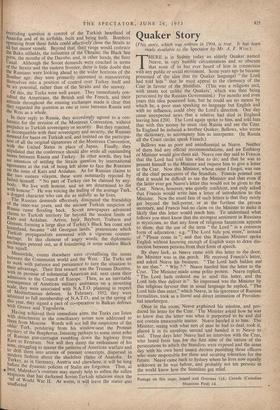Quaker Story
(This story, which was written in 1904, is true. It has been made available to the Spectator by Mr. A. F. Wise.) Bellows was as poor and uninfluential as Neave. Neither of them had any official recommendations, and no Embassy or Minister would give them aid. Neave one day said to Francis that the Lord had told him what to do; and that he was to present himself to the Minister and request him to give a letter to the Czar. Now this Minister, whose name I forget, was one of the chief persecutors of the Stundists. Francis pointed out that it would be difficult to see the Minister and that even if the latter ever got Neave's letter this would not be given to the Czar. Neave, however, was quietly confident, and only asked that Francis would write him a letter of introduction to the Minister. Now the usual fate of such letters is that they rarely get beyond the hall-porter, or at the furthest the private secretary, and Francis had no claim on the Minister to make it likely that this letter would reach him. To understand what follows you must know that the strongest sentiment in Russians is mysticism, so that any form of religious fanaticism appeals to them; that the use of the term " the Lord " is a common form of adjuration : e.g. "The Lord bids you enter," instead of " Please come in "; and that this Russian Minister spoke English without knowing enough of English ways to draw dis- tinction between persons from their form of speech.
By sheer luck, as Neave came with this letter to the door, the Minister was in the porch. He received Francis's letter, and asked Neave his business. " The Lord hath bidden me to see thee." " Why ? " Neave handed him the letter to the Czar. The Minister made some polite protest. Neave replied, " The Lord bath ordered me to send this letter, and the Lord bids thee deliver it." So impressed was the Minister by this religious fervour that in usual language he replied, " The Lord bids thee enter," which Neave, in his ignorance of Russian formalities, took as a literal and direct intimation of Providen- tial interferepce.
Once in the room, Neave explained his mission, and pro- duced his letter for the Czar. ' The Minister asked how he was to know that the letter was what it purported to be and did not contain treasonable matter. Neave handed it to him. The Minister, seeing with what sort of man he had to deal, took it, placed it in its envelope unread and handed it to Neave to seal. Three days later Neave had an interview with the Czar, who heard from him for the first time of the nature of the persecutions to which the Stundists were exposed and the same day with his own hand issued decrees punishing those officers who were responsible for these and securing toleration for the future. Neave came back to Sydney where he lives now equally unknown as he was before, and probably not ten persons in the world know how the Stundists g44, relief.


































 Previous page
Previous page